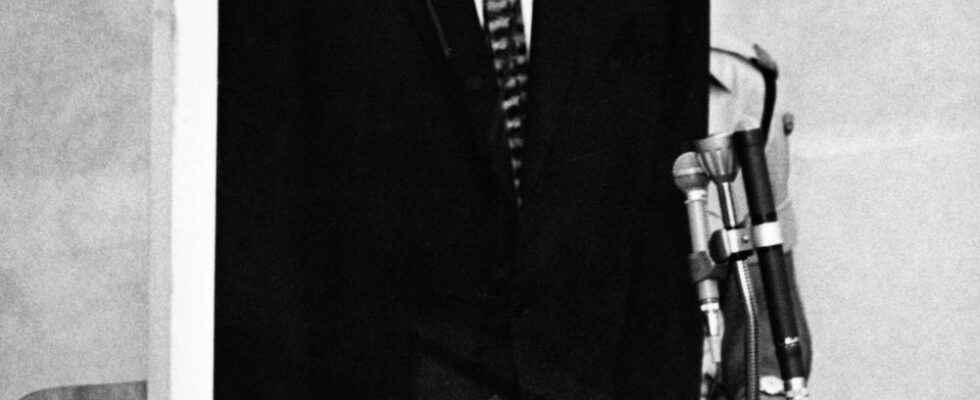At each screening of his documentary, Yariv Mozer sees upset spectators coming towards him. “I thought of my parents throughout the film. It was thanks to this trial that they finally started talking about the Shoah,” a septuagenarian tells her. Because the documentary by the Israeli director, The Devil’s Confessions, devoted to the judgment of Eichmann, completely reshuffles the cards. Based on recordings found in 2018, it revisits in depth this moment which played a major role in the construction of Israel’s identity.
Back in 1957. At the time, Adolf Eichmann was living in Buenos Aires under a false identity. After years on the run between Germany, Austria and Italy, the architect of the final solution takes up a job as a mechanic in a Mercedes factory. The Argentine capital is teeming with former Nazis, including the sinister Doctor Mengele, but none played a role as crucial as Eichmann within the Third Reich. At the head of the Jewish affairs office of the Gestapo, this SS officer methodically organized the deportation of European Jews to the death camps.
its terrifying journey fascinates the Dutch journalist Willem Sassen, himself a former Nazi refugee in Argentina, where he works for the rebirth of Hitlerism. And seeks to deny the reality of the genocide of 6 million Jews. Each week, he welcomes Eichmann to his villa in Buenos Aires, plugs in his tape recorder and questions him about the death camps. To his surprise, Eichmann confirms everything – from the careful organization of trains to Auschwitz to the “need” to rid Europe of Jews. “If we had killed 10.3 million Jews, then I would have said to myself with satisfaction: ‘That’s good, we have destroyed the enemy,'” he told Sassen.
Eichmann does not know it, but he is living his last months of freedom. On May 11, 1960, a Mossad commando kidnapped him. Drugged, he was boarded on an El Al plane and handed over to the Israeli judicial authorities as soon as he arrived in Tel Aviv. On April 11, 1961, the Nazi criminal appeared before a special court.
Adolf Eichmann, during his trial, April 11, 1961, in Jerusalem.
afp.com/-
During the eight-month hearing, prosecutor Gideon Hausner repeatedly mentioned “the Sassen documents”. Because the Dutch journalist sold Eichmann’s recordings and their transcription to the American magazine Life, who posted the scoop. Israeli justice managed to obtain an 800-page verbatim, but not the tapes. Eichman denies in block: he was only a simple executant, obeying orders, and was never animated by hatred of the Jews, but only by the legitimate concern to serve his country well.
Arendt’s “banality of evil” defeated
For lack of recordings, the Israeli justice will refuse to take into account the famous documents. She will retain only brief passages in which the Nazi criminal’s handwriting appears. On May 31, 1962, Adolf Eichmann was hanged. Sixty years after his death, the debate remains. Not on his responsibility – indisputable – in the extermination of the Jews, but on the anti-Semitic motivation of the crime. Present at the trial, the German philosopher Hannah Arendt plays down this dimension. In a resounding book published in 1963, she invented the theme of “the banality of evil”. Eichmann was not a bloodthirsty monster, but a mediocre bureaucrat sacrificing his moral judgment to please his superiors.
In 2018, the recordings resurfaced in the German National Archives in Koblenz. The institution keeps their trajectory a secret, but it is assumed that it acquired them from Eichmann’s heirs. Far from the pale bureaucrat character played by Eichmann, the tapes reveal a fanatical Nazi, ideologically motivated by the extermination of the Jews.
From these recordings, the Israeli Yariv Mozer reconstituted in a subtle staging the conversations between Eichmann and Sassen, and questioned Nazi specialists on the scope of this confession which would undoubtedly have changed the turn of the trial. “These recordings prove that Eichmann had no regrets. Sometimes I wonder if Hannah Arendt would have changed her opinion by listening to them,” wonders Yariv Mozer. In any case, the viewer will have no trouble deciding. Eichmann’s voice, his regular delivery, the cold description of his crime leave no room for doubt about the anti-Semitic character of his actions.
